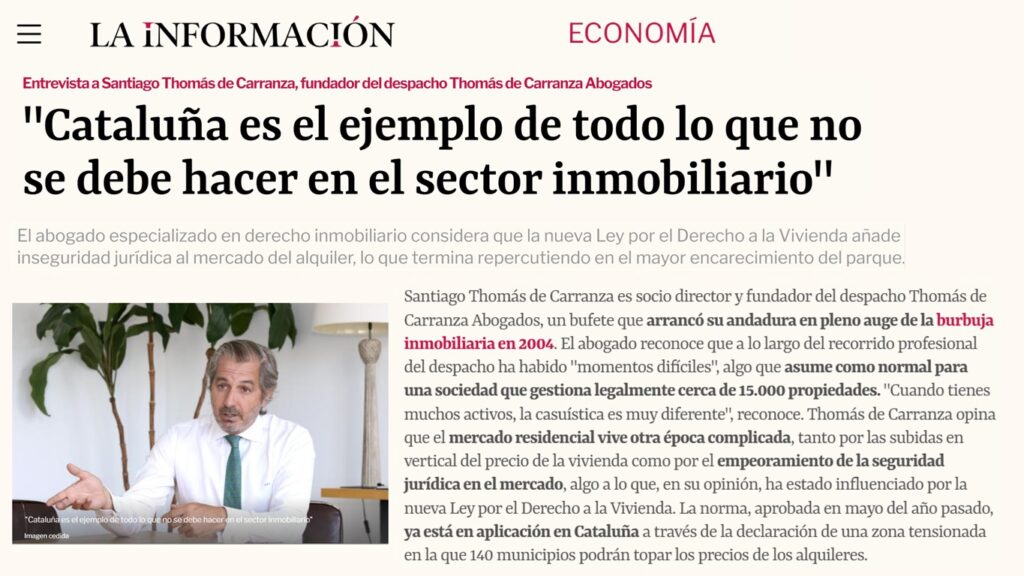
Santiago Thomás de Carranza, managing partner of the law firm, which legally manages more than 14,000 properties, says “that the residential market is going through another complicated period, both because of the vertical increases in housing prices and the worsening of legal certainty in the market”, something that, in his opinion, “has been the cause of the crisis.has been influenced by the new Housing Rights Act.
In an interview with the digital newspaper La informaciónThe lawyer states that “the problems with squatting, the difficulty in enforcing leases and recovering possession of the properties, as well as the uncertainty as to the state in which the properties will be recovered are the main elements that are generating greater insecurity for homeowners”. Santiago Thomás de Carranza stresses “the importance of providing legal stability and comfort to the owner, especially in a market like ours, where 95% of the owners are small holders”.
In addition, with regard to the profitability of the real estate market, the real estate law expert points out that “Although investing in real estate can still be beneficial, it is not for everyone. It is necessary to have the capacity to hold on, which causes large owners to concentrate in the big cities, as opposed to the small ones, who find it more difficult to buy and face risks”.
With reference to squatting, Santiago Thomás de Carranza explains that “Although it is a phenomenon that has been dragging on for a long time, it is improving thanks to the fact that society has less and less tolerance and, therefore, there is less compromise in the courts, however, it is still a real problem. Squatting is concentrated in specific areas, such as Catalonia or Madrid”.
Asked by the digital economy about the situation in Catalonia, the first autonomous community to apply the rental price regulation provided for in the Housing Law, Santiago Thomás de Carranza is convinced that “is the example of everything that should not be done in the real estate sector, especially in Barcelona. Developers are fleeing Catalonia. There is also an unacceptable tolerance for illegal squatting, because of the obstacles and difficulties in enforcing contracts. It is very difficult to recover housing, especially if there are cases of economic vulnerability involved. It is a tragedy, but the burden should not be shifted onto the narrow shoulders of the owners because the administrations have not carried out their mandate to build more social and protected housing over the years. In the end, people stop investing. They don’t want to invest in Barcelona, they have no legal security. Moreover, they have opted for a logic of ‘good guys and bad guys’ and the owners are not to blame for the fact that public housing has not been built.”
Courts: the last resort
From the experience of more than 25 years working legally in the real estate sector, Santiago Thomás de Carranza believes that when a problem of repeated non-payment arises with a tenant, “The last resort is to take it to court. It is the worst thing you can do to manage a portfolio. The thing to do is to pick up the phone. Call the tenant and ask what’s going on and most of the time, by asking, you save the lease, which is what you both want. And when it really can’t, you look for an alternative.”
“It seems reasonable to me that profitability should be sought, but not at any price. If you buy a building and there are leases, those leases must be respected. And if you try to set conditions for people to leave, that is morally unacceptable. Not everything can be defended in exchange for profitability. It is legitimate to seek profitability, but not at any price. There are other formulas. Talk to tenants and reach agreements. And if you try to go down the middle road it is neither lawful nor acceptable.” he adds.
Non-payment insurance, the solution?
Non-payment insurance has grown considerably in recent years. “They offer a guarantee to the owners, but, however, they also imply an increase in the cost of rents, since they end up being passed on to the tenant. The requirements for renting are high and only those who have greater stability have access to rent; the people who need it most cannot enter housing because there is no market for them.”adds Thomás de Carranza.
Access to the full interview:
https://www.lainformacion.com/economia-negocios-y-finanzas/cataluna-ejemplo-todo-no-se-debe-hacer-sector-inmobiliario/2900763/


